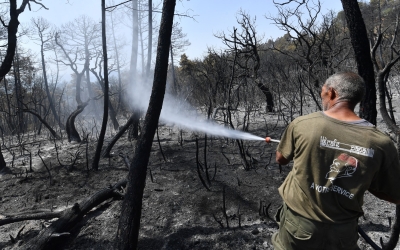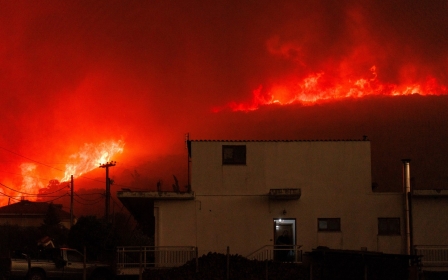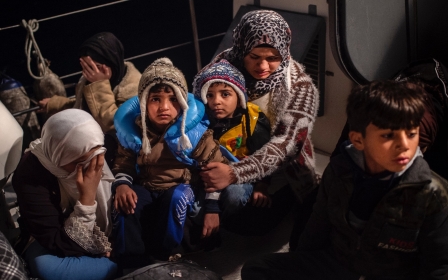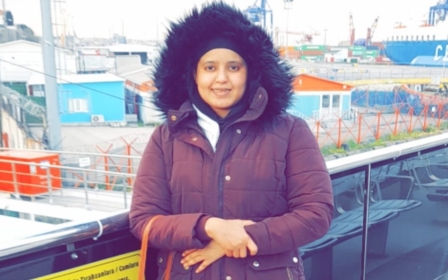Greece: Vigilantes attack refugees after blaming them for wildfires
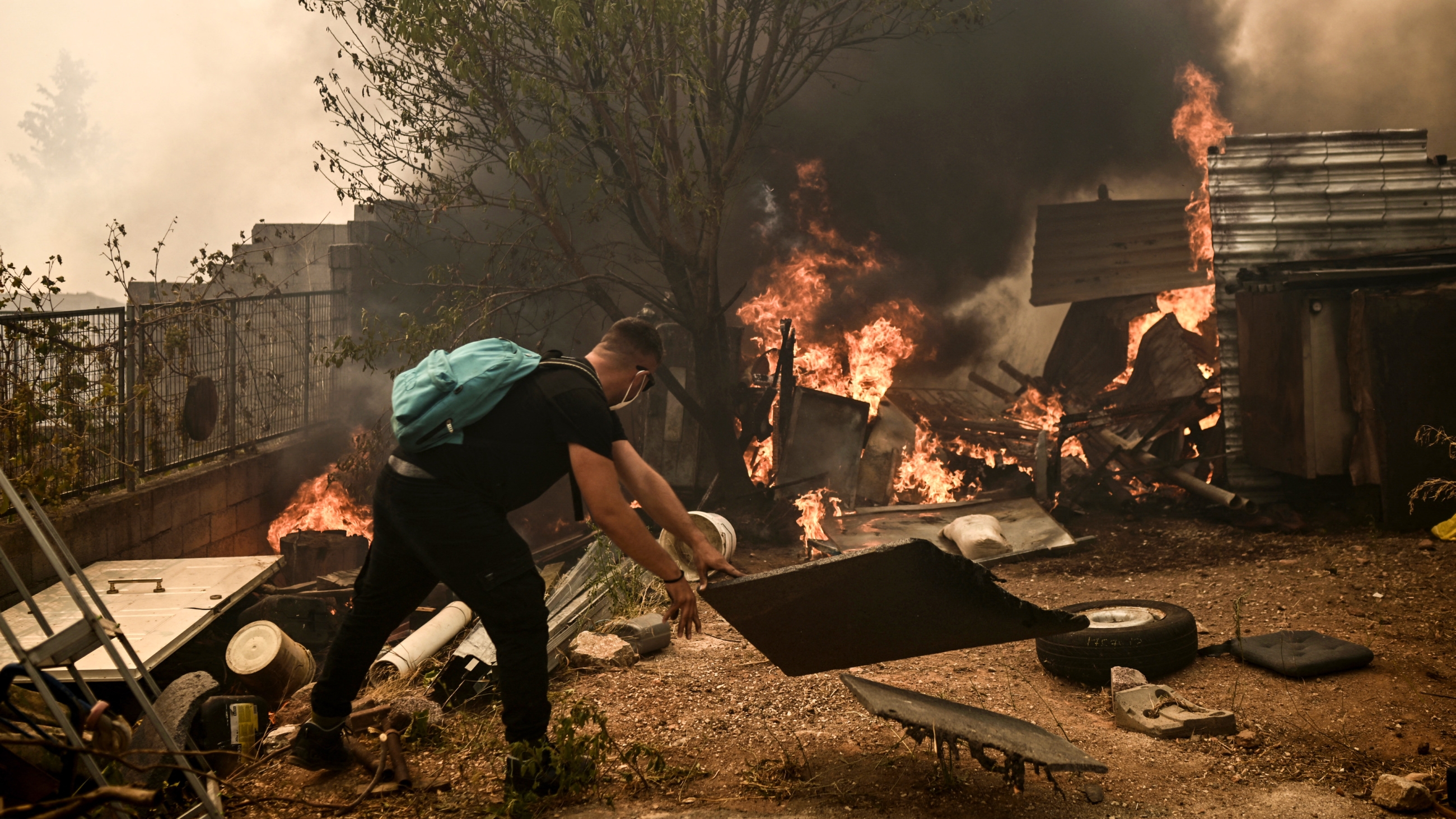
Devastating wildfires ravaging Greece have fuelled mob attacks against refugees and migrants, who are being blamed for causing the fires. Many are being assaulted and/or pushed back from Greek borders by the police.
The vigilante violence and spike in racist, anti-refugee rhetoric comes despite the fact 19 of 20 people who died from the fires this week are believed to be asylum seekers.
Paraschos Christou Papadakis, an ultra-nationalist MP, claimed on his Facebook page that migrants and refugees had started the fires, according to Amnesty International.
The Greek ministry of migration and asylum, commenting on the death of suspected asylum seekers in the fires, said the "tragedy confirms, once again, the dangers of irregular immigration".
Such claims have spread widely among far-right groups.
This is despite the Greek fire department's confirmation earlier this week that the fires were sparked by lightning and were not man-made.
Meanwhile, groups of vigilantes say they have taken the law into their own hands, organising "bounty hunting" missions to round up refugees, mainly in Alexandroupolis city in Greece’s northeastern Evros region, which has seen the worst fires.
One man boasted in a video shared online of having locked up 13 asylum seekers in his van. He blamed them for the fires and called for a “pogrom” on refugees in the area.
He was subsequently arrested for "illegal detention" along with two people suspected of helping him.
The people he abducted - who are believed to be Pakistani and Syrian - were also arrested and are due to appear before the public prosecutor on charges of arson.
Another video showed a group of people taking instructions on how to target migrants from a man dressed in military uniform.
On Tuesday, firefighters found the charred remains of 18 suspected refugees in the Dadia forest in Evros. Another dead body was found nearby on Thursday. At least two of the 19 were children. Seven to eight of the bodies were found huddled together in the forest, according to Reuters.
“At a time when at least 19 refugees are dead, instead of the state assuming its responsibilities, we unfortunately see its representatives obfuscating reality, and in some cases accepting, if not fomenting, racist discourse and practices,” Refugee Support Aegean, an NGO that supports refugees, said.
Police attacks
The densely wooded area where some of the fires are raging, and which borders Turkey, is a well-trodden route taken by refugees hoping to reach Europe.
Refugees often hide in the forest to avoid detection by Greek authorities, who have been accused of mistreating asylum seekers and sometimes pushing them back to Turkey or the sea, which is illegal under international law.
Clusters of refugees have been spotted in the path of the advancing wall of flames in recent days.
Alarm Phone, a volunteer-run hotline to support people on the move, was in contact with around 250 people and raised repeated alerts on social media.
Asylum seekers had told the organisation that the fires were getting close and that they needed help.
'We have people who, during such a difficult moment, are still being attacked by the Greek authorities'
- Alarm Phone spokesperson
The pleas went unanswered for days, Alarm Phone said.
"We informed the authorities [but] they just said, ‘we were looking for the group and we could not find them’," an Alarm Phone spokesperson told Middle East Eye.
"This is a pattern we have witnessed for a long time; this is what they say whenever a pushback is about to happen,” the spokesperson added.
Alarm Phone said that all four groups it was in contact with had been pushed back.
It also received reports of groups of refugees being “surrounded” by riot police, and photos of people wounded from beatings.
“We have people who, during such a difficult moment, are still being attacked by the Greek authorities,” Alarm Phone told MEE.
“It obviously also raises the question… during [such a] moment, how can the Greek authorities find time to execute these violent attacks?”
Violence practised 'openly'
Amid the increased violence and toxic anti-refugee rhetoric, campaigners have highlighted the glaring disparity between the pervasive presence of riot police in the fire areas, who are quick to round up refugees, and the resource-starved fire service battling to extinguish the flames.
According to Border Violence Monitoring Network, the Greek police force received 29 times the amount of funding allocated to the fire services in 2023.
This ratcheting militarisation has turned the Evros region into a "no-man’s-land", where acts of violence perpetrated by the authorities and vigilante "migrant hunters" happen undetected, due to a lack of civic officials in the region, Alarm Phone said.
'The testimonies we have published... must be described as systematic forms of torture'
- Alarm Phone
“What we are seeing is a continuation of violence against people on the move, but it is practised more openly," the volunteer group told MEE. “The testimonies we have published... must be described as systematic forms of torture.”
Caught in the crosshairs of spiralling climate breakdown and escalating militarisation of Europe’s borders, the refugees who are thought to have died in the fires this week were victims of the "two great injustices of our time", Amnesty International said on Wednesday.
"Amnesty International calls on the Greek authorities to urgently evacuate all those stranded in the Evros region and who are unable to move safely due to fires, and to ensure that refugees and migrants who have entered into Greece irregularly can seek asylum and are not illegally forcibly returned at the border," the group said.
"The Greek authorities must publicly condemn and investigate any act of racist violence or speech or incitement to such behaviours, including on the part of politicians.”
Firefighters in Greece battled more than 200 blazes in 48 hours this week, in a second deadly wave of wildfires that has engulfed swathes of the country.
The Evros fire is thought to be the most devastating on record in the EU.
Middle East Eye propose une couverture et une analyse indépendantes et incomparables du Moyen-Orient, de l’Afrique du Nord et d’autres régions du monde. Pour en savoir plus sur la reprise de ce contenu et les frais qui s’appliquent, veuillez remplir ce formulaire [en anglais]. Pour en savoir plus sur MEE, cliquez ici [en anglais].


